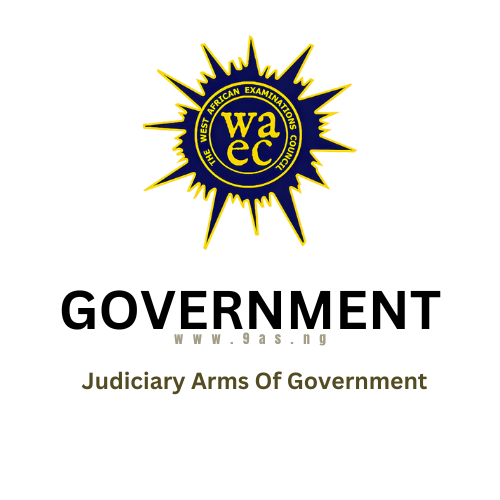THEORY
1. In what ways could the executive arm of government interfere with the independence of the judiciary?
2. How can the efficiency of the judiciary be guaranteed in safeguarding the rights of a citizen?
3. What are the characteristics of the judiciary in a state?
4. (a) What is independence of the judiciary
(b) State three reasons for the independence of the judiciary.
5. State five factors that can limit the independence of the Judiciary.
6. Outline five reasons for which the judiciary is kept independent for the control of executive and legislature.
7. Explain five factors that hamper the effective operations of the justice delivery system in a democratic state.
OBJECTIVES
1. Judicial independence means that the courts are independent of the
A. Civil Service and the Bar.
B. Executive and the Legislature.
C. Legislature and the Ministry of Justice.
D. Executive and the Military.
2. Rule adjudication is the main function of the
A. Executive.
B. President.
C. Legislature.
D. Judiciary.
3. Judicial independence means that
A. judges are above the law.
B. judges can do no wrong.
C. judges are not influenced in the discharge of their duties.
D. judiciary is the supreme organ of the state.
4. The responsibility of the judiciary is to
A. make rules.
B. formulate decisions.
C. arrest offenders.
D. adjudicate cases.
5. The verdicts of judges which are binding on lower courts are called judicial
A. orders.
B. precedents
C. council
D. oaths.
6. The Judicial organ of government is the body which
A. initiates bills.
B. interprets the law.
C. makes law.
D. maintains law and order.
7. The judicial organ of government is the body which
A. implements the law.
B. makes the law.
C. punishes lawmakers.
D. Interprets the law.
8. When an action of the executive is declared ultra-vires, it is a control exercised by the
A. public.
B. minister.
C. judiciary.
D. parliament.
9. When a court of law declares an action of the executive ultra-vires, it implies that
A. the action is illegal and above the power given.
B. the executive has to implement the action.
C. such an action should be passed into law.
D. only the legislature can deal with such an action.
10. The judiciary can only be independent when
A. law and order are maintained.
B. people obey laws.
C. the executive arm performs its duties.
D. there is security of tenure of office for judges.
11. Which of the following strengthens the power of the Supreme Court against the executive and the legislature
A. judicial percedent.
B. judicial review.
C. court injunction.
D. oath swearing.
12. When a high court declares an action of the executive ultra-vires, it means that
A. the executive has to reconsider the action.
B. such an action should never be brought up again.
C. only the legislature can deal with such an action.
D. the action is illegal and of no effect.
13. The main function of the judiciary is to
A. serve as the watchdog of executive.
B. enact laws.
C. execute the laws of the land.
D. interpret the laws.
14. An important reason for granting the Judiciary the power of Judicial Review is to enable it to A. uphold the supremacy of the Constitution.
B. promote freedom of the press.
C. elevate the Judiciary above the other organs.
D. demonstrate the independence of the Judiciary.
15. The Judiciary is independent when judges are
A. popularly elected into political offices.
B. free to join any political party of their choice.
C. free from external control and interference.
D. empowered to amend the national constitution.
16. The primary function of the judiciary is to
A. make laws.
B. enforce laws.
C. interpret laws.
D. maintain law and order.
17. Which of the following is not a function of the Dev judiciary?
A. Settlement of disputes.
B. Maintenance of law and order.
C. Interpretation of law.
D. Protection of rights.
18. The judiciary is an organ of government which
A. rules the country according to laws.
B. makes laws for the country.
C. gives legal backing to government’s budget.
D. settles disputes in accordance with the laws of the land.
19. To promote justice in a state, judges must
A. belong to the ruling party.
B. punish people who oppose them.
C. enjoy security of tenure of office.
D. not socialize with the people.
20. Independence of the judiciary connotes that
A. judges must be allowed to participate in politics.
B. court judges are free to administer oaths of office.
C. judiciary must not be involved in law-making.
D. judges must be free from any influence.
21. Which of the following protects the liberties of individuals in the state?
A. Executive.
B. Legislature.
C. Judiciary.
D. Cabinet.
22. The independence of the Judiciary can be enhanced in all the following cases except where A. judges are granted special immunity.
B. judges are paid handsome remuneration.
C. judges are politically neutral.
D. the President is also the Chief Judge.
23. The head of the judicial arm of government is known as
A. Chief justice.
B. Attorney-General.
C. a judge.
D. an advocate.
24. Judicial review means the process by which
A. judges review past court decisions and judgements.
B. the court determine the constitutionality of the actions of rulers.
C. judicial precedents are implemented.
D. the court settles disputes between citizens and government.
25. The institution connected with law adjudication is the
A. judiciary.
B. police.
C. government.
D. executive.
26. The independence of the judiciary is meant to
A. protect the rights of the judges.
B. safeguard the liberties of individuals.
C. enable judges enact laws at will.
D. allow judges to participate in partisan politics.
27. Which of the following measures will ensure the independence of the judiciary? Judges’
A. salaries must be handled by foreign banks.
B. salaries must be fixed and not subject to arbitrary review.
C. must not be separated from the executive.
D. must be controlled by the president.
28. To preserve individual liberties, the judiciary should
A. consist of honest and impartial judges.
B. be appointed by the executive.
C. be prosecuted for judgement against the executive.
D. participate in partisan politics.
29. Judicial review is a mechanism for checking
A. arbitrary use of power.
B. irresponsible journalism.
C. electoral malpractices.
D. military adventures.
30. The constitutional power given to the judiciary to interpret legislative acts, executive and
administrative actions and to declare its constitutionality or otherwise is
A. judicial power.
B. separation of powers.
C. judicial review.
D. administrative processes.
31. The principle of separating the judiciary from the other organs of government and making it free from executive and legislative influence is termed
A. judicial independence.
B. judicial review.
C. separation of powers.
D. fusion of powers.
32. The appointment of judges is based on the recommendation of the
A. Civil Service Commission
B. Public Service Commission
C. Eminent persons in society
D. Judicial Service
33. When a superior court declares an action of the executive ultra-vires, it means that
A. the executive should leave power
B. a vote of no confidence had been passed on the government
C. the judiciary is more powerful than the executive
D. The action is illegal and of no effect
34. The judiciary occupies an important place in every state because it is
A. protector of the rights of the people
B. a body of upright and just people in society
C. mandated to supervise the functions of the executive
D. a unique profession of intellectuals



